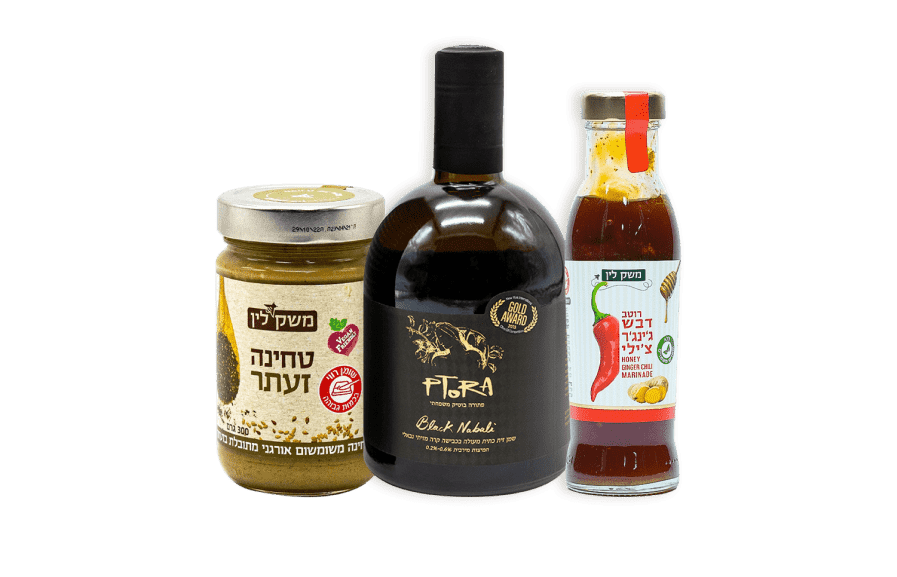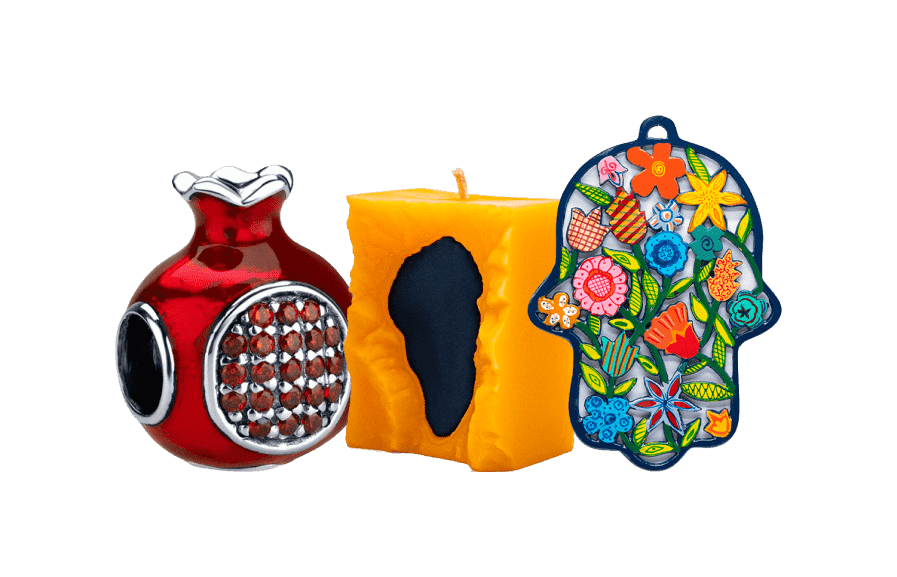The events of Pesach (Passover) celebrate the redemption of the Jewish people from slavery in Egypt. Over Eight Days (Seven in Israel), we mark the miraculous events that brought about our freedom!
Of all the Jewish festivals, it is Pesach which is observed more than any other. It celebrates the freedom of our Biblical ancestors from Egyptian bondage and the beginning of the journey in which God and our leader Moses would lead us to the borders of the promised land, Israel!
There are the crunchy Matzo crackers, the epic Passover Seder which retells the story of Exodus, and spring cleaning of our homes to a level of cleanliness you never thought possible. Did you know that the festival of Passover is only seven days long in Israel, but eight in the Jewish communities across the rest of the world? You'll discover all there is to know about this wonderful festival in our handy Passover guide below!
The story of Passover can be traced all the way back to the book of Exodus!
The festival of Passover is an eight-day festival observed between the Hebrew dates of the 15th to and including the 22nd of the Hebrew month of Nissan, just a few weeks after Purim.
It marks the events of the Exodus from Egypt and God taking the people of Israel under his direct guardianship. We observe this festival in several ways, including by not eating any unleavened foods (such as bread) and participating in the Passover Seder, in which we retell the events of the Exodus together with family and friends and recite blessings over several foods which are connected to the Passover story.

The history of Pesach begins with the transition to a new Pharaoh who forces the Jewish people into slavery. Moses, who grew up in the house of Pharaoh, saw the affliction of his brothers and sisters and was tasked by God to lead the people. We then have a series of plagues in which Moses, along with his brother Aaron repeatedly requests from Pharaoh to free the Israelites. Each time Pharaoh refuses, another plague is wrought on the Egyptian people.
On the night of the 15th of Nissan, the tenth and final plague, the killing of the firstborn Egyptians takes hold. God instructs the Jewish people to slaughter a ram and use its blood to mark their doorposts. And then, during the night, the angel of death passes over all the Jewish households. With so much devastation, Paroah's resolve is broken, and he hurries the Jewish people out of Egypt. With barely hours until they depart, the people bake bread, but because of the rush, there is no time for the bread to rise or leaven, leaving them with flat Matzo crackerbread. On that day, 600,000 Jewish souls left Egyptian bondage on the way to becoming God's people, receiving the Torah at Mount Sinai, and eventually arriving at the borders of Israel!
On the night of the 15th of Nissan, the tenth and final plague, the killing of the firstborn Egyptians takes hold. God instructs the Jewish people to slaughter a ram and use its blood to mark their doorposts. And then, during the night, the angel of death passes over all the Jewish households. With so much devastation, Paroah's resolve is broken, and he hurries the Jewish people out of Egypt. With barely hours until they depart, the people bake bread, but because of the rush, there is no time for the bread to rise or leaven, leaving them with flat Matzo crackerbread. On that day, 600,000 Jewish souls left Egyptian bondage on the way to becoming God's people, receiving the Torah at Mount Sinai, and eventually arriving at the borders of Israel!

In the lead-up to Passover, we prepare our homes in honor of the festival!
Perhaps it's where spring cleaning originated, but there really is nothing like the cleaning that occurs in the Jewish household before Pesach. Every room, every cupboard, from children's toys to the household car, they are all cleaned spic and span to the last detail. And in the kitchen, hours are spent scrubbing, washing, and cleaning to remove all traces of Chametz.
Chametz is leavened grain and before Passover we are instructed to remove all traces of it from our homes and ownership. This ingredient is present in many of our everyday pantry items, from bread to cereals and even our precious whiskey collection! But the good news is that it can be sold to a non-Jewish person and bought back after Passover! On the eve of Pesach, we carry out what is called Bedikat Chametz, the search for Chametz across the household, and the following morning, we burn all the remaining Chametz in our possession. On a spiritual level, Chametz is compared to our sins, so Pesach cleaning is a way of ridding ourselves of our sins! We really should be grateful to our wives and mothers who clean our homes so thoroughly! We also replace our kitchen utensils with special sets used just for Passover and stock up on kosher for Pesach foods, drinks and ingredients.
Another important activity that takes place is the baking of Matzos, the crunchy, thin, unleavened crackers that replace our bread for the duration of Pesach! In fact, Lev Haolam subscribers have previously received some of the most famous Matzo in Israel, made by the Yehuda Matzo factory in Jerusalem!

On Pesach, we celebrate our freedom and do it with the Passover Seder!
On Seder night, we gather with family and friends around the dining room table, dressed in our finest clothing. On the table are Matza, wine, and the Seder Plate on which the Simanim (signs) are laid out, including bitter herbs, hard-boiled eggs, and a shank bone. Over the next couple of hours, we will read from the Pesach Haggadah and reenact the story of the Exodus. The Simanim enables us to connect and symbolically feel what it was like for our ancestors in Egypt. We eat bitter herbs to represent the bitterness of slavery; the Matza reminds us of the Exudos as our ancestors hurried to leave Egypt without enough time for their 'bread' to rise and the shank bone represents the Passover sacrifice. The four cups of wine are drunk while leaning to the left, in a reclining position, to celebrate our newly found freedom from slavery! The Seder is very interactive, with plenty of role play and games to involve our young children. Don't be surprised to see many little plastic frogs flying across the table when we replicate the ten plagues!
Passover is truly one of the most beautiful festivals. It takes a lot of hard work to prepare for it but you come into the festival with a feeling of satisfaction from all the effort you put in. And you feel the sense of freedom, not just of our ancestors, but ours, as we retell the Pesach story. Many people take time off during Passover to spend with their families. From going to the Synagogue to pray with the community to the Passover Seders and the time spent outdoors discovering and connecting with the beautiful Land of Israel, the Passover festival is truly wonderful for all who observe it! While all Jewish communities worldwide observe Passover, certain aspects can ONLY occur in the Holy Land. One is the annual priestly blessing on Chol Hamoed (the days in the middle of Passover). On this day, tens of thousands flock to the Old City of Jerusalem to receive the blessing from hundreds of Jewish Priests (Cohanim). It is a truly magical sight to be seen!

With Lev Haolam, you can feel the love of the Holy Land wherever you are in the world!
We are proud to work with hundreds of talented artisans and small business owners who live in communities across the Biblical heartlands of Judea and Samaria, the Galilee, and the Golan Heights.
This enables us to share their wonderful products with subscribers who get to experience their very own personal tour across the Biblical heartlands of Israel in the comfort of their own homes! Along with the accompanying magazine featuring exclusive interviews and profiles on the people behind the products, plus updates from Israel on our social channels and exclusive members-only content, you'll get to know Israel like never before!
Each product is the pioneer's way of showing their deepest gratitude and appreciation to subscribers. The impact is tremendous as it enables them to provide for their families, keep offering meaningful employment opportunities, and contribute to the development of their communities. What this means, in essence, is that every subscriber is playing an active part in revitalizing the Biblical heartlands of Judea and Samaria!









